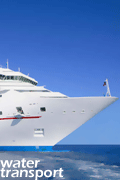Thursday, April 2, 2009
Cleaner marine engines are now available to boaters. You can be more environmentally friendly by following a few tips when using your boat.
You Can Make a Difference In Preventing Marine Engine Pollution
Over 10 million marine engines are operated in the United States. These marine engines are among the highest contributors of hydrocarbons (HC) and oxides of nitrogen (NOx) emissions in many areas of the country. HC and NOx produce ground-level ozone, which irritates the respiratory system causing chest pain and lung inflammation. Ozone can also aggravate existing respiratory conditions such as asthma. Boaters can join many others who are working to make a difference in preventing pollution from marine engines.
Improving the Marine Engine
 The U.S. Environmental Protection Agency (EPA) set emission standards for commercial and recreational marine engines that went into effect in 1998. All engines will meet the standards by 2006, when the phased in implementation period is completed. To meet the stringent standards, the marine industry developed technology for a new generation of low emission, high performance engines that are available now to recreational boaters.
The U.S. Environmental Protection Agency (EPA) set emission standards for commercial and recreational marine engines that went into effect in 1998. All engines will meet the standards by 2006, when the phased in implementation period is completed. To meet the stringent standards, the marine industry developed technology for a new generation of low emission, high performance engines that are available now to recreational boaters.
Boaters Can Prevent Pollution
Even with the new technology, the cooperation of individual boaters is essential in the effort to improve air quality and prevent pollution. Boaters can make a difference that will help protect the environment now and in the future by adopting the following practices:
By combining these strategies, boaters can reduce pollution from marine engines and help improve air quality across the nation and protect public health.
Source: http://www.epa.gov/
You Can Make a Difference In Preventing Marine Engine Pollution
Over 10 million marine engines are operated in the United States. These marine engines are among the highest contributors of hydrocarbons (HC) and oxides of nitrogen (NOx) emissions in many areas of the country. HC and NOx produce ground-level ozone, which irritates the respiratory system causing chest pain and lung inflammation. Ozone can also aggravate existing respiratory conditions such as asthma. Boaters can join many others who are working to make a difference in preventing pollution from marine engines.
Improving the Marine Engine
 The U.S. Environmental Protection Agency (EPA) set emission standards for commercial and recreational marine engines that went into effect in 1998. All engines will meet the standards by 2006, when the phased in implementation period is completed. To meet the stringent standards, the marine industry developed technology for a new generation of low emission, high performance engines that are available now to recreational boaters.
The U.S. Environmental Protection Agency (EPA) set emission standards for commercial and recreational marine engines that went into effect in 1998. All engines will meet the standards by 2006, when the phased in implementation period is completed. To meet the stringent standards, the marine industry developed technology for a new generation of low emission, high performance engines that are available now to recreational boaters.Boaters Can Prevent Pollution
Even with the new technology, the cooperation of individual boaters is essential in the effort to improve air quality and prevent pollution. Boaters can make a difference that will help protect the environment now and in the future by adopting the following practices:
- Limit engine operation at full throttle.
- Eliminate unnecessary idling.
- Avoid spilling gasoline.
- Use a gasoline container you can handle easily and hold securely.
- Pour slowly and smoothly.
- Use a funnel or a spout with an automatic stop device to prevent overfilling the gas tank.
- Close the vent on portable gas tanks when the engine is not in use or when the tank is stored.
- Transport and store gasoline out of direct sunlight in a cool, dry place.
- Use caution when pumping gasoline into a container at the gas station.
- Carefully measure the proper amounts of gasoline and oil when refueling.
- Follow the manufacturer's recommended maintenance schedule.
- Prepare engines properly for winter storage.
- Buy new, cleaner marine engines.
By combining these strategies, boaters can reduce pollution from marine engines and help improve air quality across the nation and protect public health.
Source: http://www.epa.gov/
posted by transport blogs
@ 9:40 PM
permanent link | Post a Comment
|
![]()









